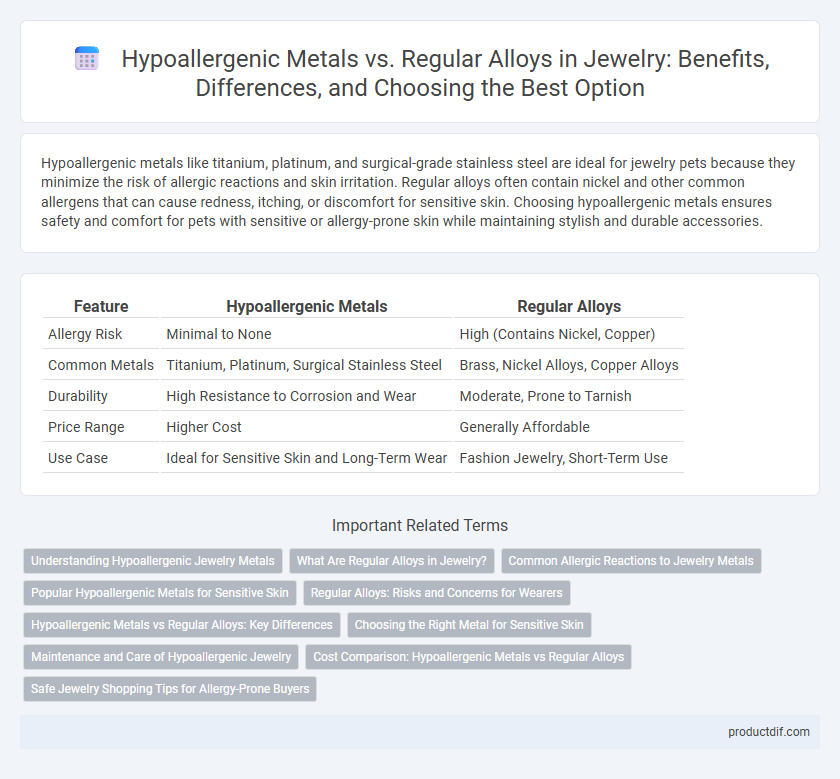Hypoallergenic metals like titanium, platinum, and surgical-grade stainless steel are ideal for jewelry pets because they minimize the risk of allergic reactions and skin irritation. Regular alloys often contain nickel and other common allergens that can cause redness, itching, or discomfort for sensitive skin. Choosing hypoallergenic metals ensures safety and comfort for pets with sensitive or allergy-prone skin while maintaining stylish and durable accessories.
Table of Comparison
| Feature | Hypoallergenic Metals | Regular Alloys |
|---|---|---|
| Allergy Risk | Minimal to None | High (Contains Nickel, Copper) |
| Common Metals | Titanium, Platinum, Surgical Stainless Steel | Brass, Nickel Alloys, Copper Alloys |
| Durability | High Resistance to Corrosion and Wear | Moderate, Prone to Tarnish |
| Price Range | Higher Cost | Generally Affordable |
| Use Case | Ideal for Sensitive Skin and Long-Term Wear | Fashion Jewelry, Short-Term Use |
Understanding Hypoallergenic Jewelry Metals
Hypoallergenic jewelry metals, such as titanium, platinum, and surgical-grade stainless steel, minimize skin irritation and allergic reactions by containing little to no nickel or other common allergens found in regular alloys. These metals offer durability and corrosion resistance, making them ideal for sensitive skin and long-term wear. Choosing hypoallergenic metals ensures comfort and safety without compromising style or quality in jewelry design.
What Are Regular Alloys in Jewelry?
Regular alloys in jewelry are mixtures of two or more metals, often combining base metals like copper, nickel, and zinc with precious metals such as gold or silver to enhance durability and affordability. These alloys can cause allergic reactions in sensitive individuals due to the presence of nickel or other irritants. Understanding the composition of regular alloys is essential for selecting jewelry that balances aesthetics with skin safety.
Common Allergic Reactions to Jewelry Metals
Nickel, a common component in regular alloys, frequently triggers allergic reactions such as redness, itching, and swelling in sensitive individuals. Hypoallergenic metals like titanium, platinum, and surgical-grade stainless steel minimize the risk of dermatitis by avoiding reactive elements. Choosing hypoallergenic jewelry metals significantly reduces the incidence of contact allergies and promotes skin comfort.
Popular Hypoallergenic Metals for Sensitive Skin
Popular hypoallergenic metals for sensitive skin include titanium, surgical-grade stainless steel, and platinum, all known for their minimal allergenic properties. Titanium is highly resistant to corrosion and lightweight, making it ideal for everyday wear without causing irritation. Surgical-grade stainless steel contains very low nickel levels, reducing the risk of allergic reactions compared to regular alloys that often include higher amounts of nickel and cobalt.
Regular Alloys: Risks and Concerns for Wearers
Regular alloys in jewelry often contain metals like nickel, copper, and zinc, which can cause allergic reactions such as skin irritation, redness, and itching for sensitive wearers. Prolonged exposure to these metals increases the risk of contact dermatitis and may lead to long-term skin sensitivity or immune responses. Choosing jewelry with high-quality hypoallergenic metals reduces the chance of adverse reactions and promotes safer, more comfortable wear.
Hypoallergenic Metals vs Regular Alloys: Key Differences
Hypoallergenic metals, such as titanium, platinum, and surgical-grade stainless steel, are specifically formulated to minimize allergic reactions by avoiding nickel and other common irritants found in regular alloys. Regular alloys, often composed of mixed metals including nickel, copper, and zinc, can cause skin irritation and allergic responses due to their reactive metal components. The key difference lies in the purity and composition of hypoallergenic metals, which offer enhanced biocompatibility and reduced risk of dermatitis compared to standard jewelry alloys.
Choosing the Right Metal for Sensitive Skin
Hypoallergenic metals such as titanium, platinum, and surgical-grade stainless steel significantly reduce the risk of skin irritation and allergic reactions compared to regular alloys that often contain nickel or copper. Choosing these metals ensures comfort and safety for sensitive skin, as they are less likely to cause redness, itching, or dermatitis. Investing in jewelry made from hypoallergenic materials promotes long-term wearability without compromising skin health.
Maintenance and Care of Hypoallergenic Jewelry
Hypoallergenic metals such as titanium, platinum, and surgical-grade stainless steel require less maintenance compared to regular alloys due to their resistance to tarnish, corrosion, and skin irritants. Unlike regular jewelry alloys containing nickel or copper, hypoallergenic pieces retain their luster without frequent cleaning or polishing. Proper care includes gentle cleaning with mild soap and water, storing in a dry place, and avoiding exposure to harsh chemicals to preserve their durability and hypoallergenic properties.
Cost Comparison: Hypoallergenic Metals vs Regular Alloys
Hypoallergenic metals such as titanium, platinum, and surgical stainless steel typically cost more than regular alloys like brass, copper, or nickel due to their purity and resistance to causing allergic reactions. The manufacturing process for hypoallergenic metals involves higher-quality materials and stricter standards, contributing to increased prices. Regular alloys, while more affordable, often contain nickel or other allergens that can cause skin irritation, making hypoallergenic options a worthwhile investment for sensitive skin.
Safe Jewelry Shopping Tips for Allergy-Prone Buyers
Hypoallergenic metals such as titanium, platinum, and surgical-grade stainless steel significantly reduce the risk of allergic reactions compared to regular alloys containing nickel or copper. Allergy-prone buyers should prioritize jewelry labeled as nickel-free and opt for pure metals or high-quality hypoallergenic options to ensure skin safety. Always check for certifications and customer reviews, and consider testing new jewelry on a small skin area before prolonged wear to avoid irritation.
Hypoallergenic Metals vs Regular Alloys Infographic

 productdif.com
productdif.com